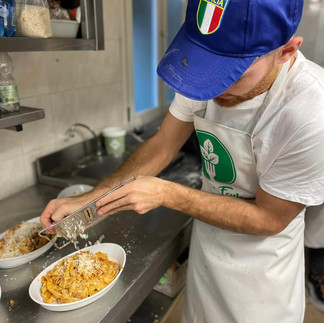KA210 Y0U - "Green Fork"
- Associazione Most

- Jan 22, 2024
- 2 min read
The Green Fork project, an initiative under the KA210 YOU Erasmus+ Program, has been a remarkable journey for Associazione Most in partnership with Fundatsiya Kurazh (Bulgaria), Restart (Slovakia), and Youth Council Next Generation (North Macedonia). This article aims to encapsulate the essence of the various meetings held in Bulgaria, Slovakia, Skopje, and Italy, each contributing uniquely to the project's goal of promoting sustainable cooking practices.
Bulgaria: The project kicked off with an eventful meeting at the Professional Tourism High School "Prof. Dr. Asen Zlatarov." The focus was on integrating sustainable cooking principles into educational programs and daily life. This included using every ingredient fully, minimizing waste, and utilizing local, nature-friendly resources. The highlight was a gastronomic exchange where partners showcased traditional dishes adhering to these sustainable principles. Italy presented an appetizing aperitivo, Macedonia delighted with a bean dish, and Slovakia offered tasty halushki, making the event not just informative but also deliciously engaging.
Slovakia: In Slovakia, the emphasis was on learning new recipes that align with zero-waste cooking. Participants prepared dishes like gnocchi, potato chips with guacamole, and strudel, demonstrating how sustainable practices can be incorporated into diverse cuisines. The experience was not just about cooking but also about enjoying the process with a smile, highlighting the joy of eco-friendly culinary practices.
N. Macedonia: The Skopje meeting was centred around a cooking class where participants learned to make famous traditional Macedonian dishes. This session, involving partners from all four countries, was a deep dive into the rich culinary heritage of North Macedonia. The delicious feast was followed by a delightful walk through Skopje, blending culinary and cultural exploration.
Italy: Italy's meeting was a fitting finale to this culinary journey, focusing on fresh pasta and lasagna. This session underscored the importance of fresh, locally sourced ingredients in sustainable cooking. It also highlighted the versatility of Italian cuisine in adopting eco-friendly practices.
Throughout these events, the Green Fork project successfully fostered a deeper understanding of sustainable cooking. It showed that environmental responsibility can be delicately integrated into culinary practices across different cultures. Each country brought its unique flavours and techniques to the table, creating a rich tapestry of sustainable culinary arts.


























































Comments